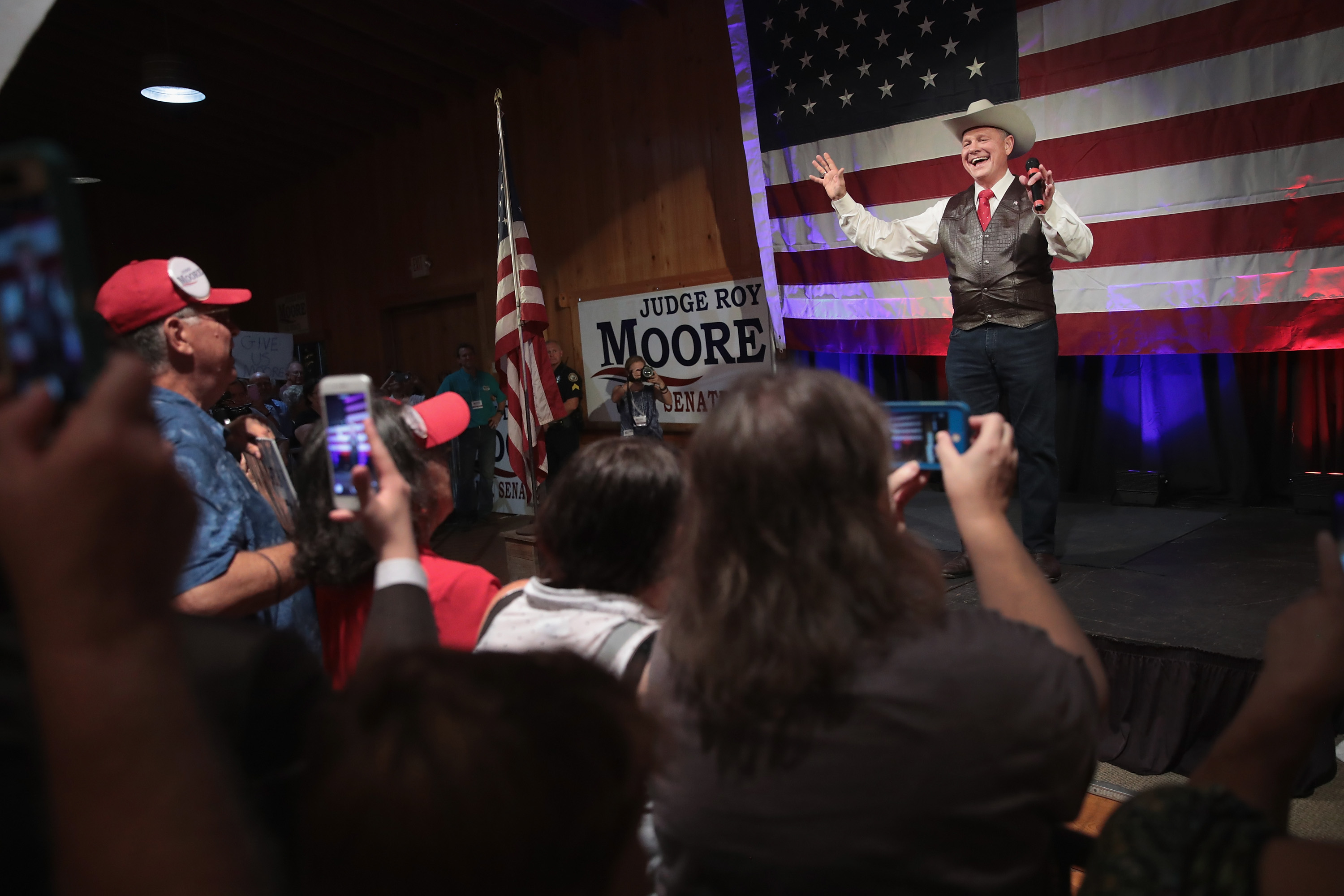Roy Moore's Alabama victory shows Trumpism might not actually need Trump
A movement gets a mind of its own


The Senate Republican primary runoff in Alabama presented a thoroughly bizarre test of President Trump's political clout given that no one could quite figure out who the "pro-Trump" candidate was. On paper, at least, that designation belonged to Sen. Luther Strange, who received Trump's enthusiastic endorsement. The president went down to Alabama to campaign for Strange, tweeted incessantly about his appreciation for "Big Luther," and even boasted (in a since-deleted tweet) that Strange "has been shooting up in the Alabama polls since my endorsement."
As with so many of Trump's pronouncements, that turned out to be nonsense. Strange lost badly on Tuesday night to former Alabama Chief Justice Roy Moore. A committed birther who rails against the political establishment and vents irrational hatred toward Muslims, Moore was clearly the Trumpier of the two candidates. Moore didn't get Trump's endorsement, but he got the backing of pretty much every other cog in the ramshackle Trump political machine, including recently ousted White House chief strategist Stephen Bannon.
The primary victory means Roy Moore is almost certainly going to the Senate, which is an objectively terrible outcome. Moore is a performative extremist and bigot who specializes in fomenting controversy to draw attention to himself. He was famously kicked off the Alabama Supreme Court for defying a judicial order to remove a monument to the Ten Commandments he'd installed at his courthouse. After being re-elected to the court, he was subsequently suspended for illegally ordering state judges to disregard the U.S. Supreme Court ruling legalizing gay marriage.
The Week
Escape your echo chamber. Get the facts behind the news, plus analysis from multiple perspectives.

Sign up for The Week's Free Newsletters
From our morning news briefing to a weekly Good News Newsletter, get the best of The Week delivered directly to your inbox.
From our morning news briefing to a weekly Good News Newsletter, get the best of The Week delivered directly to your inbox.
One might be tempted to think that Moore's nomination could give Democrats a narrow opening to snatch the seat. After all, recent electoral history is littered with examples of Republicans blowing Senate races by nominating far-right cranks over establishment favorites — Sharron Angle in Nevada, Christine O'Donnell in Delaware, and Richard Mourdock in Indiana come to mind. But that seems unlikely in Alabama's case. The state is deeply red and very much in the throes of the Trumpian revolt against anything perceived to be tainted by establishment politics.
As for Trump himself, it's mildly embarrassing that his stumping for Strange didn't carry the incumbent over the finish line. But Moore has already demonstrated that he's in tune with Trump's base and is strongly aligned with the president's agenda. So while Trump's preferred candidate didn't win, Trumpism nonetheless came out ahead.
And that brings us to the key question raised by this bizarre primary: How much does Trumpism actually require Trump? He clearly wasn't able to tilt his core group of voters towards his preferred candidate, but even then, Trump himself was at times circumspect about his endorsement of Strange. Speaking at a campaign rally for the incumbent, Trump allowed that he "might have made a mistake" in endorsing Strange because a loss would be cast as an "embarrassment." At the same time, he promised to "campaign like hell" for Moore if he won. A lot of Alabama voters felt that Trump had erred in backing Strange, and Trump's own messaging basically confirmed that suspicion.
The whole campaign was tinged with this weird question of what, exactly, Trump thought he was doing. Bannon himself even raised the possibility that Trump had been manipulated into backing Strange by some malicious cabal of Republican establishment insiders. Trump is fond of describing his base as a "movement," but in this case the movement acted directly against the wishes of its leader, who may or may not have been acting as a puppet of their enemies. Moore's victory shows us that Trumpism will outlast Trump because it doesn't need him.
A free daily email with the biggest news stories of the day – and the best features from TheWeek.com
One big loser in the Alabama runoff is Senate Majority Leader Mitch McConnell, who found himself under attack by both candidates as an obstacle to the Trump agenda. The Senate Leadership Fund, a McConnell-allied super PAC, dumped millions of dollars into the race in support of Luther Strange, and in return Strange promised to "stand up to Mitch McConnell, John McCain, and even our Republican so-called conservatives who stand in the way of the president's agenda." Trump went on Alabama radio and said that Strange's opponents "like to label him as Mitch's best friend but he's not. He hardly even knows him. He'll be fighting Mitch."
Moore, for his part, campaigned on the promise that his election would end McConnell's tenure in the Senate leadership. Everything about Moore's time in public life indicates that, as a senator, he'll be an extremist and an agent of chaos, as well as a national embarrassment. He'll cause McConnell endless grief and be a self-sabotaging hindrance to the Republican agenda. And even though Trump didn't back Moore in the primary, there's nothing Trumpier than that.
Simon Maloy is a political writer and researcher in Washington, DC. His work has been published by The Huffington Post, The American Prospect, and Salon.
-
 Shots fired in the US-EU war over digital censorship
Shots fired in the US-EU war over digital censorshipIN THE SPOTLIGHT The Trump administration risks opening a dangerous new front in the battle of real-world consequences for online action
-
 What will the US economy look like in 2026?
What will the US economy look like in 2026?Today’s Big Question Wall Street is bullish, but uncertain
-
 Alaa Abd el-Fattah: should Egyptian dissident be stripped of UK citizenship?
Alaa Abd el-Fattah: should Egyptian dissident be stripped of UK citizenship?Today's Big Question Resurfaced social media posts appear to show the democracy activist calling for the killing of Zionists and police
-
 Bari Weiss’ ‘60 Minutes’ scandal is about more than one report
Bari Weiss’ ‘60 Minutes’ scandal is about more than one reportIN THE SPOTLIGHT By blocking an approved segment on a controversial prison holding US deportees in El Salvador, the editor-in-chief of CBS News has become the main story
-
 Has Zohran Mamdani shown the Democrats how to win again?
Has Zohran Mamdani shown the Democrats how to win again?Today’s Big Question New York City mayoral election touted as victory for left-wing populists but moderate centrist wins elsewhere present more complex path for Democratic Party
-
 Millions turn out for anti-Trump ‘No Kings’ rallies
Millions turn out for anti-Trump ‘No Kings’ ralliesSpeed Read An estimated 7 million people participated, 2 million more than at the first ‘No Kings’ protest in June
-
 Ghislaine Maxwell: angling for a Trump pardon
Ghislaine Maxwell: angling for a Trump pardonTalking Point Convicted sex trafficker's testimony could shed new light on president's links to Jeffrey Epstein
-
 The last words and final moments of 40 presidents
The last words and final moments of 40 presidentsThe Explainer Some are eloquent quotes worthy of the holders of the highest office in the nation, and others... aren't
-
 The JFK files: the truth at last?
The JFK files: the truth at last?In The Spotlight More than 64,000 previously classified documents relating the 1963 assassination of John F. Kennedy have been released by the Trump administration
-
 'Seriously, not literally': how should the world take Donald Trump?
'Seriously, not literally': how should the world take Donald Trump?Today's big question White House rhetoric and reality look likely to become increasingly blurred
-
 Will Trump's 'madman' strategy pay off?
Will Trump's 'madman' strategy pay off?Today's Big Question Incoming US president likes to seem unpredictable but, this time round, world leaders could be wise to his playbook
